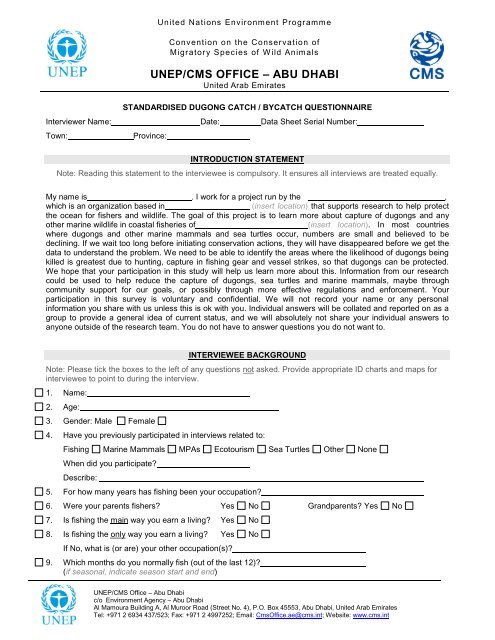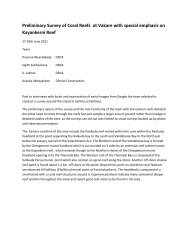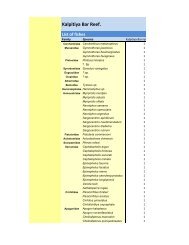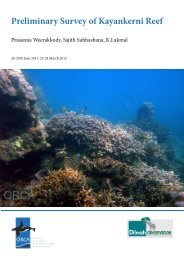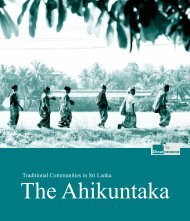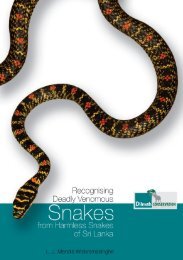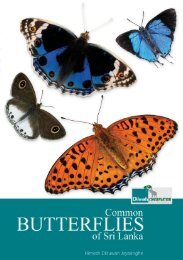Standardised Dugong Questionnair
Standardised Dugong Questionnair
Standardised Dugong Questionnair
You also want an ePaper? Increase the reach of your titles
YUMPU automatically turns print PDFs into web optimized ePapers that Google loves.
United Nations Environment Programme<br />
Convention on the Conservation of<br />
Migratory Species of W ild Animals<br />
UNEP/CMS OFFICE – ABU DHABI<br />
United Arab Emirates<br />
STANDARDISED DUGONG CATCH / BYCATCH QUESTIONNAIRE<br />
Interviewer Name: Date: Data Sheet Serial Number:<br />
Town:<br />
Province:<br />
INTRODUCTION STATEMENT<br />
Note: Reading this statement to the interviewee is compulsory. It ensures all interviews are treated equally.<br />
My name is . I work for a project run by the ,<br />
which is an organization based in<br />
(insert location) that supports research to help protect<br />
the ocean for fishers and wildlife. The goal of this project is to learn more about capture of dugongs and any<br />
other marine wildlife in coastal fisheries of<br />
(insert location). In most countries<br />
where dugongs and other marine mammals and sea turtles occur, numbers are small and believed to be<br />
declining. If we wait too long before initiating conservation actions, they will have disappeared before we get the<br />
data to understand the problem. We need to be able to identify the areas where the likelihood of dugongs being<br />
killed is greatest due to hunting, capture in fishing gear and vessel strikes, so that dugongs can be protected.<br />
We hope that your participation in this study will help us learn more about this. Information from our research<br />
could be used to help reduce the capture of dugongs, sea turtles and marine mammals, maybe through<br />
community support for our goals, or possibly through more effective regulations and enforcement. Your<br />
participation in this survey is voluntary and confidential. We will not record your name or any personal<br />
information you share with us unless this is ok with you. Individual answers will be collated and reported on as a<br />
group to provide a general idea of current status, and we will absolutely not share your individual answers to<br />
anyone outside of the research team. You do not have to answer questions you do not want to.<br />
INTERVIEWEE BACKGROUND<br />
Note: Please tick the boxes to the left of any questions not asked. Provide appropriate ID charts and maps for<br />
interviewee to point to during the interview.<br />
1. Name:<br />
2. Age:<br />
3. Gender: Male Female<br />
4. Have you previously participated in interviews related to:<br />
Fishing Marine Mammals MPAs Ecotourism Sea Turtles Other None<br />
When did you participate?<br />
Describe:<br />
5. For how many years has fishing been your occupation?<br />
6. Were your parents fishers? Yes No Grandparents? Yes No<br />
7. Is fishing the main way you earn a living? Yes No<br />
8. Is fishing the only way you earn a living? Yes No<br />
If No, what is (or are) your other occupation(s)?<br />
9. Which months do you normally fish (out of the last 12)?<br />
(if seasonal, indicate season start and end)<br />
UNEP/CMS Office – Abu Dhabi<br />
c/o Environment Agency – Abu Dhabi<br />
Al Mamoura Building A, Al Muroor Road (Street No. 4), P.O. Box 45553, Abu Dhabi, United Arab Emirates<br />
Tel: +971 2 6934 437/523; Fax: +971 2 4997252; Email: CmsOffice.ae@cms.int; Website: www.cms.int
Please tick the boxes to the left of any questions not asked. Provide appropriate ID charts and maps for<br />
interviewee to point to during the interview.<br />
10. How many days each week do you fish? days (low season) days (peak season)<br />
11. What is your position on the boat? The captain A crew member We have no fixed positions<br />
I do not work on a boat<br />
(Skip next questions if this is the response)<br />
12. How many fishers, including yourself, work on the boat?<br />
13. How long is the boat?<br />
(Note to interviewer: convert and provide answer in meters)<br />
14. Is the boat motorized? Yes No (if yes) Inboard Outboard<br />
15. What is the horsepower of the motor?<br />
DUGONG CATCH / BYCATCH<br />
16. Have you ever seen a dugong? Yes No<br />
Do you have another name for it?<br />
17. Tell me about the difference between a dugong and a dolphin?<br />
18. How long do you think a dugong lives? Don’t know<br />
19. How do you get to see dugongs? Seen while fishing Seen while travelling to fishing areas<br />
Accidentally caught in nets Hunted Stranded on the beach Other<br />
Where do you normally fish? (Note to interviewer: Complete attached table and mark all locations on maps)<br />
20. How frequently have you seen dugongs? Never Once in my life Only a few times in my life<br />
Frequently<br />
Every year for the last five years<br />
In the last year, only once several times every month every week every day .<br />
21. Do you have any dugong specialists or catchers in your village? Yes No How many?<br />
22. Have people in your community ever hunted dugongs? Yes No Don’t Know<br />
(if yes) How many (people)?<br />
Do they do so now? Yes No Don’t Know<br />
For how long?<br />
23. Do people from other villagers / communities hunt dugongs? Yes No Don’t Know<br />
Who? What village? Any other details?<br />
Is the catch accidental or on purpose? Accidental On purpose Both<br />
24. Compared to when you started fishing, are there more , less , or the same number of dugongs<br />
captured in fishing gear? Don’t Know (Note to interviewer: based on actual numbers, not perception)<br />
(if more or less) Why do you think this?<br />
25. Do you know of any areas where dugongs regularly occur? Yes No<br />
Where are these dugong areas?:<br />
(Note to interviewer: Regular means certain times of year when they are always found. Indicate on maps)<br />
26. Do these dugong areas change over time? Yes No Don’t Know<br />
27. Have you ever seen dugongs calving? Yes No When? (what month?)<br />
Where did you see them calving? (use maps)?<br />
28. How many dugongs do you think might live in the important areas? 1 10 Don’t Know<br />
2
Please tick the boxes to the left of any questions not asked. Provide appropriate ID charts and maps for<br />
interviewee to point to during the interview.<br />
29. When do you see dugongs? (indicate months or seasons where possible):<br />
30. When was the last time you saw a dugong? (if long time ago note the year)<br />
31. Did you catch any dugongs in the last year? Yes No (accidentally or hunted)<br />
(if yes) How many in the last year? 1-2 ≤10 >10 Specifics (if available):<br />
Was this is a typical number to catch in a year? Yes<br />
No<br />
(if no) Was it higher or lower than usual? Higher Lower<br />
Was the catch accidental or was it something you were fishing for? Accidental Hunted Both<br />
32. How many in the last five years? 0 1-2 ≤10 >10 Specifics (if available):<br />
How many in your life? 0 1-2 ≤10 >10 Specifics (if available):<br />
33. What do you do (or would you do) with a dugong if you caught one? (do not lead interviewee)<br />
Eat Sell Use as Bait Other Use Discard (dead) Release (alive)<br />
34. Have you ever found or heard of dugongs stranded on the shore? Yes No (explain stranded)<br />
Or have you ever found or heard of dugongs dead at sea? Yes No<br />
(if yes) Where (also indicate on maps)?<br />
When and how many?<br />
What happened to the animal?<br />
35. What would you do or did you do if you found a stranded dugong?<br />
PERCEPTIONS<br />
36. Compared to when you started fishing, do you think there are more dugongs , less , or the same<br />
numbers of dugongs<br />
? I don’t know<br />
(if more or less) Why do you think this?<br />
(Note to interviewer: Try to determine what other impacts may be driving the trend)<br />
37. Do you think there will always be dugongs in the sea? Yes No Don’t Know<br />
(if yes or no) Why?<br />
38. Do you think having dugongs around is important? Yes No Don’t know Why?<br />
39. Do you know what seagrass areas are? Yes No (Note to Interviewer: show graphics)<br />
Are there any seagrass areas around here? Yes No Don’t know Where?<br />
(Note to Interviewer: mark on maps)<br />
Do you fish in these seagrass areas? Yes No<br />
Are these seagrass areas important for anything else? Yes No Why?<br />
40. Is it illegal to (intentionally) kill a dugong? Yes No Don’t know<br />
What about by accident (maybe caught in a net unintentionally)? Yes No Don’t know<br />
41. Are any areas routinely / periodically patrolled? Frequently Infrequently Never Don’t know<br />
42. If yes, are penalties ever imposed? Frequently Infrequently Never Don’t know<br />
3
Please tick the boxes to the left of any questions not asked. Provide appropriate ID charts and maps for<br />
interviewee to point to during the interview.<br />
43. Are there any local customs, beliefs, legends or rituals or stories related to dugongs? Yes No<br />
(if yes) Please describe:<br />
Where / from whom did you hear this?<br />
44. Additional stories / incidents you wish to report:<br />
FISHERY INFORMATION<br />
Note to interviewer: Respondent should answer these questions to describe his/her individual experience, not<br />
that of their community. Use illustrations to assist where necessary.<br />
Habitat Codes: (D) Deep Water; (C) Coral; (S) Seagrass; (F) Fine Sediments; (M) Mangroves; (R) Rocks;<br />
(E) Estuaries; (U) Unknown<br />
45. What type of fishing gear do you use? (Indicate what months)<br />
Longline Only Mostly Sometimes Season:<br />
(many hooks) Habitat: Target:<br />
Bottom longline Only Mostly Sometimes Season:<br />
(many hooks set at depth) Habitat:<br />
Target:<br />
Hook and line Only Mostly Sometimes Season:<br />
(one or few hooks) Habitat: Target:<br />
Purse seine Only Mostly Sometimes Season:<br />
(or surround nets) Habitat: Target:<br />
Beach seine Only Mostly Sometimes Season:<br />
Habitat:<br />
Target:<br />
Trawl nets Only Mostly Sometimes Season:<br />
(or other towed net) Habitat: Target:<br />
Traps Only Mostly Sometimes Season:<br />
Habitat:<br />
Target:<br />
Gill or trammel nets Only Mostly Sometimes Season:<br />
Other (describe):<br />
Habitat:<br />
Target:<br />
Do you tend the nets when they are in the water? Yes<br />
How long do you leave the nets in the water?<br />
Do you fish during the day or night ? Both ?<br />
What is the position of the gear? Surface Midwater Bottom<br />
Describe the net: Length Depth Mesh size<br />
Only Mostly Sometimes Season:<br />
Habitat:<br />
Target:<br />
No<br />
hours<br />
4
Please tick the boxes to the left of any questions not asked. Provide appropriate ID charts and maps for<br />
interviewee to point to during the interview.<br />
46. In what places do you normally fish?<br />
(Use prepared road maps, charts, Google maps and have interviewee point out areas)<br />
Do you use different gears in different areas? Yes No If yes, please describe:<br />
(Use prepared road maps, charts, Google maps, and have interviewee point out areas)<br />
47. Do people in your village / community target sharks? Yes No No, but they are occasionally landed<br />
Please elaborate:<br />
(Note to interviewer: This can be area sensitive)<br />
SEA TURTLE CATCH / BYCATCH<br />
(Optional if time permits and interviewee is keen)<br />
48. Have you ever seen sea turtles? Yes No Do you have another name for them?<br />
49. What species of turtles do you see? Green Hawksbill Olive Ridley Loggerhead<br />
Flatback Leatherback Don’t know<br />
Do you know the difference between these turtle species? Yes No Don’t know<br />
(Note to Interviewer; Show ID chart or graphics)<br />
Please describe:<br />
Do they have different names? (if yes) Please list:<br />
50. How long do you think a turtle lives? Don’t know<br />
(determine for each species)<br />
51. How do you get to see turtles? Seen while fishing Seen while travelling to fishing areas<br />
Coming ashore to lay eggs Accidentally caught in nets Hunted Stranded on the beach<br />
Other<br />
(Note to interviewer: Complete attached table and mark all locations on maps)<br />
52. How frequently have you seen turtles? Never Once in my life Only a few times in my life<br />
Frequently<br />
Every year for the last five years<br />
In the last year, only once several times every month every week every day<br />
53. Do you have any turtle experts in your village? Yes No How many?<br />
54. What about in other villages? Yes No Who? What village?<br />
55. Have people in your community ever hunted turtles? Yes No Don’t Know<br />
(if yes) How many?<br />
For how long?<br />
56. Do they do so now? Yes No Don’t Know<br />
57. Do people from other villagers / communities hunt turtles? Yes No Don’t Know<br />
Who? What village? Any other details?<br />
58. Compared to when you started fishing, are there more , less , or the same number of turtles<br />
captured in fishing gear? Don’t Know<br />
(if more or less) Why do you think this?<br />
59. Do you know of any areas where turtles regularly occur? Yes No<br />
Where are these turtle areas?:<br />
(Note to interviewer: also indicate on maps)<br />
(Note to interviewer: based on actual numbers, not perception)<br />
60. Do these turtle areas change over time? Yes No Don’t Know<br />
5
Please tick the boxes to the left of any questions not asked. Provide appropriate ID charts and maps for<br />
interviewee to point to during the interview.<br />
61. Do you see mating turtles? Yes No When? Where (use maps)?<br />
62. How many turtles do you think might live in these areas? 10 >100 Don’t Know<br />
63. When do you see turtles? (indicate months or seasons):<br />
64. When was the last time you saw a turtle? (if a long time ago note the year)<br />
65. Did you catch any turtles in the last year? Yes No<br />
(if yes) How many in the last year? 1-2 ≤10 >10 What species? (if available):<br />
Was this is a typical number to catch in a year? Yes<br />
Was the catch accidental or was it something you were fishing for? Accidental Hunted Both<br />
66. How many in the last five years? 0 1-2 ≤10 >10 Specifics (if available):<br />
67. How many in your life? 0 1-2 ≤10 >10 Specifics (if available):<br />
68. What do you do (or would you do) with a turtle if you caught one?<br />
Eat Sell Use as Bait Other Use Discard (dead) Release (alive) (do not lead interviewee)<br />
(Note differences by species where possible and if available)<br />
69. Have you ever found or heard of turtles stranded on the shore? Yes No (explain stranded)<br />
Or have you ever found or heard of turtles dead at sea? Yes No<br />
(if yes) Where? (also indicate on maps)<br />
When and how many?<br />
What happened to the animal?<br />
70. What would you do or did you do if you found a stranded turtle?<br />
71. Compared to when you started fishing, do you think there are more turtles , less , or the same<br />
numbers of turtles<br />
? I don’t know<br />
(if more or less) Why do you think this?<br />
(Note to interviewer: Try to determine what other impacts may be driving the trend)<br />
72. Do you think there will always be turtles in the sea? Yes No Don’t Know<br />
(if more or less) Why?<br />
73. Do you think having turtles around is important? Yes No Why?<br />
74. It is illegal to (intentionally) kill a turtle? Yes No Don’t know<br />
What about by accident (maybe caught in a net unintentionally)? Yes No Don’t know<br />
75. Are there any local customs, beliefs, legends or rituals or stories related to turtles? Yes No<br />
(if yes) Please describe:<br />
No<br />
Where / from whom did you hear this?<br />
6
Please tick the boxes to the left of any questions not asked. Provide appropriate ID charts and maps for<br />
interviewee to point to during the interview.<br />
DOLPHIN CATCH / BYCATCH<br />
(Optional if time permits and interviewee is keen)<br />
76. Have you ever seen dolphins? Yes No Do you have another name(s) for them?<br />
77. What species of dolphins do you see (describe)?<br />
Any other cetaceans (describe)?<br />
78. How long do you think dolphins live? Don’t know<br />
(list by species)<br />
Don’t know<br />
79. How do you get to see dolphins? Seen while fishing Seen while travelling to fishing areas<br />
Accidentally caught in nets Hunted Stranded on the beach Other<br />
Are these areas different by species? Yes No Don’t Know<br />
(if yes) Please explain:<br />
(Note to interviewer: mark locations on maps by species)<br />
80. How frequently have you seen dolphins? Never Once in my life Only a few times in my life<br />
Frequently<br />
Every year for the last five years<br />
In the last year: Only once Several times Every month Every week Every day<br />
81. Do you have any dolphin experts in your village? Yes No How many?<br />
82. What about in other villages? Yes No Who? What village?<br />
83. Have people in your community ever hunted dolphins or other mammals? Yes No<br />
Don’t Know (if yes) How many? For how long?<br />
84. Do they do so now? Yes No Don’t Know<br />
85. Compared to when you started fishing, are there more , less , or the same number of dolphins<br />
captured in fishing gear? Don’t Know<br />
(if more or less) Why do you think this?<br />
86. Do you know of any areas where dolphins regularly occur? Yes No<br />
Where are these dolphin areas?:<br />
(Note to interviewer: also indicate on maps)<br />
(Note to interviewer: based on actual numbers, not perception)<br />
87. Do these dolphin areas change over time? Yes No Don’t Know<br />
88. How many dolphins do you think might live in these areas? 10 >100 Don’t Know<br />
89. When do you see dolphins? (indicate months or seasons):<br />
90. When was the last time you saw one? (if long time ago note the year)<br />
91. Did you catch any dolphins in the last year? Yes No<br />
(if yes) How many in the last year? 1-2 ≤10 >10 Specifics (if available):<br />
Was this is a typical number to catch in a year? Yes<br />
Was the catch accidental or was it something you were fishing for? Accidental Hunted Both<br />
92. How many in the last five years? 0 1-2 ≤10 >10 Specifics (if available):<br />
93. How many in your life? 0 1-2 ≤10 >10 Specifics (if available):<br />
94. What do you do (or would you do) with a dolphin if you caught one? (do not lead interviewee)<br />
Eat Sell Use as Bait Other Use Discard (dead) Release (alive)<br />
No<br />
7
Please tick the boxes to the left of any questions not asked. Provide appropriate ID charts and maps for<br />
interviewee to point to during the interview.<br />
95. Have you ever found or heard of dolphins stranded on the shore? Yes No (explain stranded)<br />
Or have you ever found or heard of dolphins dead at sea? Yes No<br />
(if yes) Where (also indicate on maps)?<br />
When and how many?<br />
What happened to the animal?<br />
96. What would you do or did you do if you found a stranded dolphin?<br />
97. Compared to when you started fishing, do you think there are more dolphins , less , or the same<br />
numbers of dolphins<br />
? I don’t know<br />
(if more or less) Why do you think this?<br />
(Note to interviewer: Try to determine what other impacts may be driving the trend)<br />
98. Do you think there will always be dolphins in the sea? Yes No Don’t Know<br />
(if more or less) Why?<br />
99. Do you think having dolphins around is important? Yes No Why?<br />
100. It is illegal to (intentionally) kill a dolphin? Yes No Don’t know<br />
What about by accident (maybe caught in a net unintentionally)? Yes No Don’t know<br />
101. Are there any local customs, beliefs, legends or rituals or stories related to dolphins? Yes No<br />
(if yes) Please describe:<br />
Where / from whom did you hear this?<br />
8
Please tick the boxes to the left of any questions not asked. Provide appropriate ID charts and maps for<br />
interviewee to point to during the interview.<br />
CONFIDENTIAL INTERVIEWER COMMENTS<br />
102. How open and honest did the fisher seem about answering bycatch questions?<br />
Very open/honest Somewhat open/honest Not honest<br />
103. How interested and engaged did the fisher seem with interview?<br />
Very interested Moderately interested Bothered/ Not interested<br />
104. How certain did the fisher seem about answers to numerical questions?<br />
Very sure Reasonable sure Unsure<br />
105. How comfortable were you about the respondents' ability to discriminate between the species<br />
Very comfortable Reasonable Not comfortable<br />
106. Why do you think this?<br />
107. Please indicate why (if any) questions were not asked<br />
9
Survey<br />
ID<br />
Number<br />
Sighting<br />
Record<br />
#<br />
#<br />
Individuals<br />
seen<br />
Habitat<br />
Size<br />
S,L<br />
Mother -<br />
Calf Pair<br />
Y / N<br />
Day /<br />
Night<br />
Year<br />
Month<br />
Dead /<br />
Alive<br />
Cause<br />
Condition<br />
Accidental<br />
/ Direct<br />
Reported<br />
Y / N<br />
Notes<br />
Habitat Codes:<br />
Cause:<br />
Condition:<br />
(D) Deep Water; (C) Coral; (S) Seagrass; (F) Fine Sediments; (M) Mangroves; (R) Rocks; (E) Estuaries; (U) Unknown<br />
(G) Gill net, (O) Other Fishing Gear (specify in notes), (B) Boat Strike, (H) Hunting (D) Don’t Know<br />
(F) Fresh, (D) Decomposed<br />
UNEP/CMS Office – Abu Dhabi<br />
c/o Environment Agency – Abu Dhabi<br />
Al Mamoura Building A, Al Muroor Road (Street No. 4), P.O. Box 45553, Abu Dhabi, United Arab Emirates<br />
Tel: +971 2 6934 437/523; Fax: +971 2 4997252; Email: CmsOffice.ae@cms.int; Website: www.cms.int


